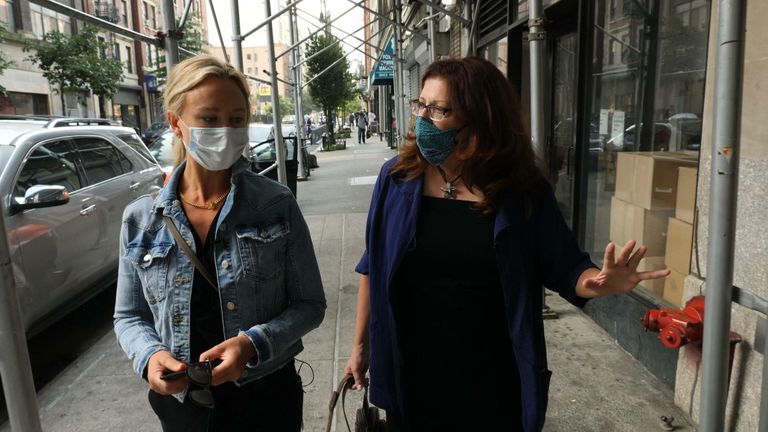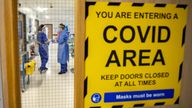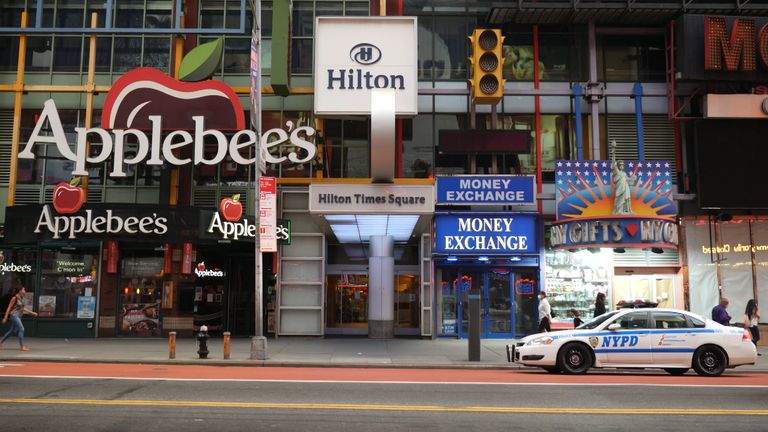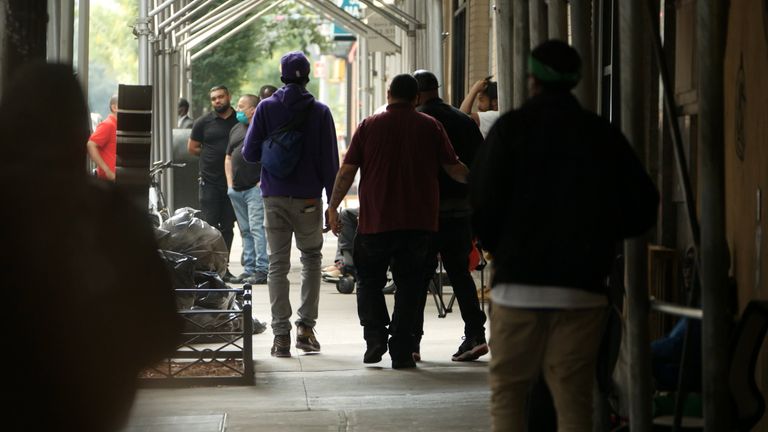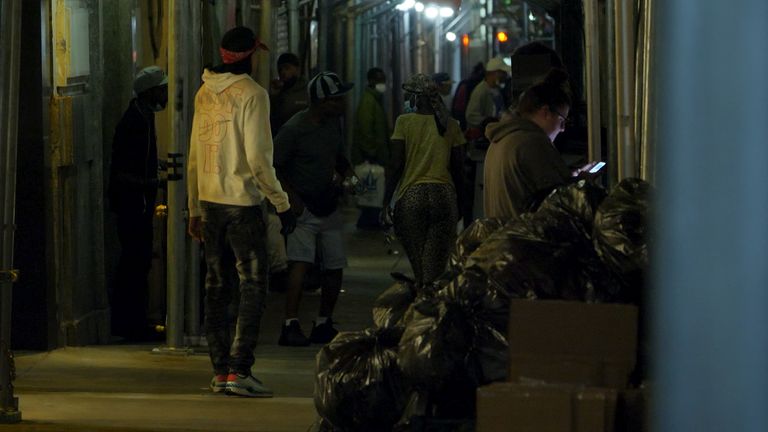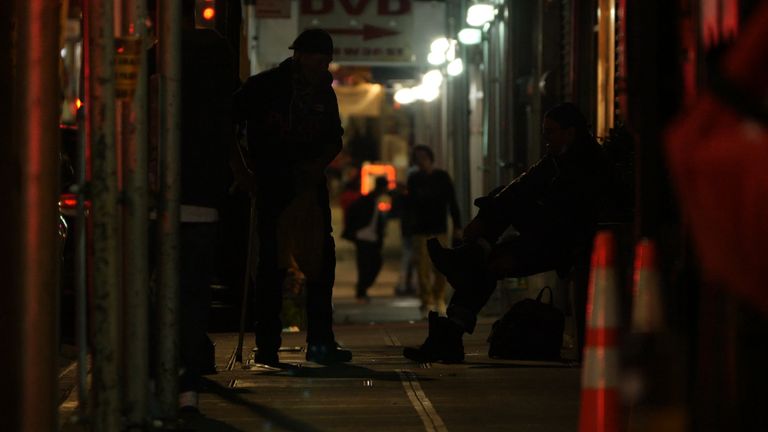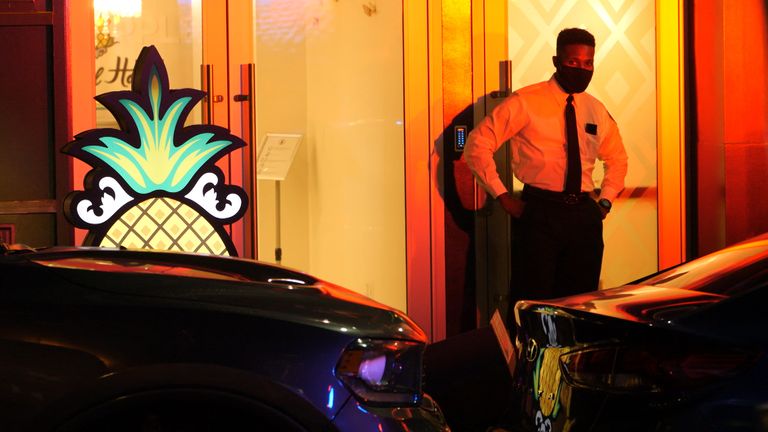Empty hotels being used as homeless shelters shows the huge economic cost of COVID in New York
With travel to New York banned from 35 US states, the city's economy is struggling to stay afloat.
Sunday 18 October 2020 16:54, UK
In the city that never sleeps, areas of Manhattan are almost unrecognisable.
Coronavirus has hit New York harder than perhaps any other city in the world.
It became the global epicentre of the COVID-19 pandemic in the spring, losing more than 33,000 citizens.
While strict measures have brought contagion under control, it's come at social and economic costs that threaten to last far longer than the impact being felt in other US cities.
New York's unemployment rate is twice the national average at 16%.
Apartment vacancies are at a record high and nine in 10 bars and restaurants have struggled to pay their rent in recent months.
The quarantine measures have stifled even domestic tourism and businesses that closed temporarily seven months ago are now shutting for good.
"The situation is really dire," says Vijay Dandapani, president and CEO of the Hotel Association of New York.
"It's at a tipping point in terms of how many hotels are going out of business and the cause of that is an 85% drop in business from where it was the previous year.
"We need to have something better than a quarantine that essentially looks at New York City as a fort with a moat around it and the drawbridge taken away so no one can come in.
"Forget international travel, you cannot come to New York City from 35 different states - that's essentially the entire United States.
"We understand the public safety aspect behind the quarantine but it's like taking a hammer to knock out a fly."
At the time of writing there are 35 restricted states on New York's quarantine list.
Officials and police currently stop domestic travellers on arrival to the city's airports and train stations and people have to fill out a form or face a $2,000 (£1,550) fine.
Consequently the city's economy can't rely on domestic tourism and the hospitality industry has been flattened.
New York's metropolitan area has lost nearly 44% of jobs in the leisure and hospitality sector in the last year compared to 24% nationally.
This has resulted in billions of dollars in lost tax revenue for the city which pays for teachers, police and the fire department among other city services.
"We had 55,000 employees before 22 March. Now barely 10,000 are working," Mr Dandapani told Sky News.
"Today we're accommodating close to 13,000 homeless people in hotels.
"Nearly 200 hotels are catering to either the homeless, first responders or a few government officials. That's really most of the business that's here in the city today," he said.
The statistics are unmissable in midtown Manhattan. The crowds have all but vanished. Office blocks are empty. Second homeowners have fled the city.
Crime has soared, with the New York Police Department making the highest number of gun arrests on record last month - up 98% on last year.
Many hotels are now temporary shelters for the homeless, with the state department of homeless services using 139.
The city relocated approximately 10,000 individuals to hotels at the height of the pandemic to ensure safety and social distancing.
But drug and mental health issues among some of the shelter guests make it a complex picture - and six months on it's creating tension in Manhattan's neighbourhoods.
Many residents complain of drug use, increased crime and say they feel less safe.
"I know many people on this block will not go out at night. They will not go out at 7pm, not just at night," says Marisa Redanty, district leader for Manhattan neighbourhood Hell's Kitchen.
"There are days where we feel even walking on the street to get groceries you have to be aware all the time. People have been hit doing nothing and knocked out."
Two hotels on the same block on West 36th Street now accommodate homeless people.
Each night the area sees a steady stream of ambulances responding to problems.
James Tucker moved here from a shelter in March and says having more space has made a big difference, but it's not fair that homeless residents have to share with people with drug or mental health problems.
"It's a messed-up situation on both ends. Certain people don't belong in a shelter let's just be honest.
"Some people have mental illness, a lot of other things. I feel like they need to evaluate better," he told Sky News.
For neighbouring businesses, the social impact of these homeless shelters is making it even tougher for them to operate.
"You don't totally know what's going on and the tensions are a little high," says Paul Fable, owner of the Poseidon Bakery.
He is determined to stay open despite business being tough and describes how his customers are regularly harassed by people asking for money.
New York's recovery feels a long way off.
For residents and business owners - there's no known end date to the quarantine measures or temporary shelters in Manhattan.
For many hotels, funding to house the vulnerable is for now the only way they will survive this financial crisis.
The NYC Department of Social Services said: "As a city, we are not currently in a position where health experts say it is safe for individuals to return to congregate shelters.
"Of course, we will continue to evaluate all factors and facts as our city works to reopen while ensuring virus rates remain low and will of course advise New Yorkers as these plans develop and inform communities when we are ready to take that step."
